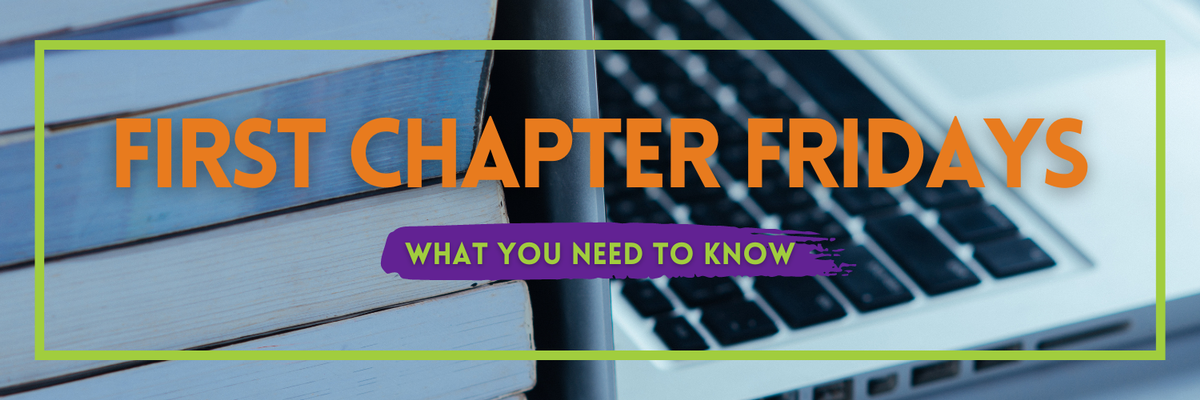

BLOGS > JULY 16, 2024
BY LAURALEE MOSS

Starting First Chapter Friday in your middle school or high school language arts classroom? You won’t regret it! Starting First Chapter Friday requires no special tools, only students and a high-interest book with a dynamic first chapter. Implementing First Chapter Friday is simple. You have a few decisions to make concerning how you will implement the process in your classroom, but the actual activity is simple.
Before Starting
First, choose a book that students will want to borrow. (If you are looking for a First Chapter Friday book, I have ten listed below.) Then, advertise the book to students before Friday. This can be a pretty note on your board, a posting in your digital classroom or the title on your letter board.
Research the book and the author. You will not only want to decide if the book will fit your community, but you will also want to find tidbits about the author that will interest students. Find the author’s social media channels or a clip from an interview. One of the beautiful benefits of First Chapter Friday is to connect literature to students’ lives.
You can check out Follett’s #FirstChapterFriday video list where the authors read the first chapter of their book!
Titlewave is also a great place to get more insight into a book you are considering. With professional reviews and Follett Tags to use, you’ll be able to determine if it’s a good fit.
Before Friday, decide when you would like to read to students. I read at the start of class so that our discussions don’t get cut short. Finally, decide what procedures you expect of your students. I simply tell students that they will need to listen without their iPads or phones. I allow students to doodle if that helps them to focus.
On Friday
Start with running the procedures by students. I rarely explain procedures more than once or twice!
Then, introduce the book, almost like a book talk. I often show screenshots of Instagram or Twitter posts from my research about the author. Some teachers put a crackling fire on the overhead to set the mood.
Read the first chapter to students. Reading aloud with secondary students might seem odd if you’ve never done so, but students will enjoy it. As you finish, tell students they may borrow the book if they like it. Sometimes a conversation will start about the author or part of the first chapter. I place the book up front so students can see it, and then I start class. Simple!
Whether you're just starting First Chapter Friday, or have already done a few, you might still have questions. Below, I’ve included four benefits of reading aloud with secondary students.
You’ll find your own benefits of First Chapter Friday and your own routines.

LAURALEE MOSS
Lauralee Moss has taught high school English in Illinois for over ten years. She holds a BS in English Education from Southern Illinois University and an MA in Teaching and Leadership. She blogs at LanguageArtsClassroom.com. You can find her on Instagram and at home with her husband, three kids, and crazy dog.
How to Supercharge Your Summer Reading Program
February 23, 2026
For years, Follett Content has been a leading supplier of books for school libraries and classrooms. With our rich tradition of outstanding service, we’ve fully embraced the opportunity to serve public libraries and are forging ahead by providing essential resources...
Read more
2026 ALA Youth Media Award Winners: Find the Best Children's & YA Books of the Year
January 26, 2026
On their 150th anniversary, the American Library Association (ALA) revealed the ALA YMA 2026 winners and honorees on January 26, 2026, honoring the year’s most exceptional books and media for children and teens. Recognized globally for their impact and excellence, the...
Read more
An Author Interview with Jennie Wood
January 9, 2026
From non-binary author Jennie Wood, creator of the acclaimed graphic novel series Flutter, comes I Didn't Ask For This, which follows a group of kids who share one thing in common: their parents are social media influencers who’ve shared their...
Read more
An Author Interview with Don Everts
December 17, 2025
What peculiar thread connects secret superpowers, chicken farming, Victorian architecture, and the impossible awkwardness of being 14? Debut middle grade author Don Everts weaves it together for us in this conversation about his new book, Oscar and the Mystery of...
Read more
An Author Interview with Sara Amini and Illustrator Shadia Amin
December 17, 2025
Author Sara Amini and artist Shadia Amin team up for this charming, semi-autobiographical middle grade graphic memoir that explores evolving friendships, puberty mishaps, and finding a place to belong. Navigating life as a multiracial girl has never been more hilarious...
Read more
An Author Interview with Katherine Applegate
December 17, 2025
Go behind the scenes with Newbery Medal-winning author and literary superstar Katherine Applegate as she discusses her returns with two exciting new titles releasing in spring! First up is The Littlest Elephant, a picture book adaptation of the best-selling middle grade...
Read more